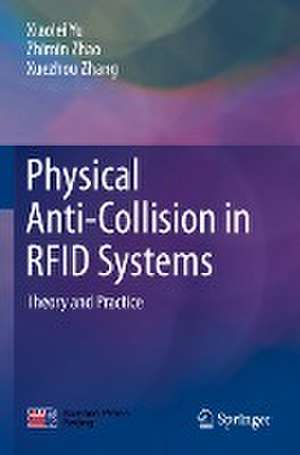Physical Anti-Collision in RFID Systems: Theory and Practice
Autor Xiaolei Yu, Zhimin Zhao, Xuezhou Zhangen Limba Engleză Paperback – 16 apr 2022
| Toate formatele și edițiile | Preț | Express |
|---|---|---|
| Paperback (1) | 581.79 lei 6-8 săpt. | |
| Springer Nature Singapore – 16 apr 2022 | 581.79 lei 6-8 săpt. | |
| Hardback (1) | 644.49 lei 6-8 săpt. | |
| Springer Nature Singapore – 15 apr 2021 | 644.49 lei 6-8 săpt. |
Preț: 581.79 lei
Preț vechi: 684.46 lei
-15% Nou
Puncte Express: 873
Preț estimativ în valută:
111.33€ • 119.05$ • 92.82£
111.33€ • 119.05$ • 92.82£
Carte tipărită la comandă
Livrare economică 18 aprilie-02 mai
Preluare comenzi: 021 569.72.76
Specificații
ISBN-13: 9789811608377
ISBN-10: 9811608377
Pagini: 237
Ilustrații: XII, 237 p. 168 illus., 43 illus. in color.
Dimensiuni: 155 x 235 mm
Greutate: 0.36 kg
Ediția:1st ed. 2021
Editura: Springer Nature Singapore
Colecția Springer
Locul publicării:Singapore, Singapore
ISBN-10: 9811608377
Pagini: 237
Ilustrații: XII, 237 p. 168 illus., 43 illus. in color.
Dimensiuni: 155 x 235 mm
Greutate: 0.36 kg
Ediția:1st ed. 2021
Editura: Springer Nature Singapore
Colecția Springer
Locul publicării:Singapore, Singapore
Cuprins
Preface.- Chapter 1. Overview of anti-collision technologies in RFID systems.- Chapter 2. Experimental verification system of physical anti-collision in RFID systems.- Chapter 3. Physical theory of physical anti-collision in RFID systems.- Chapter 4. Image theory of physical anti-collision in RFID systems.- Chapter 5. Optimization algorithms and physical anti-collision in RFID systems.- Chapter 6. Deep learning and physical anti-collision in RFID systems
Notă biografică
Xiaolei YU
Xiaolei YU received his B.E. and M.E. degrees in information and communication engineering from Nanjing University of Aeronautics and Astronautics, Nanjing, China, and the Ph.D. degree from the University of Melbourne, Australia. He works as Professor in Nanjing University of Aeronautics and Astronautics. His current research interests include radio frequency signal processing and internet-of-things technology.
Zhimin ZHAO
Zhimin ZHAO received the M.E. degree from Nanjing University of Aeronautics and Astronautics, Nanjing, China, in 1991. Since 2001, she has been a Professor with the Nanjing University of Aeronautics and Astronautics. She has visited Commonwealth Scientific and Industrial Research Organisation (CSIRO) in Australia as a distinguished scientist from 2008 to 2010. Her current research interests include precision measurement technology. Xuezhou ZHANG
Xuezhou ZHANG works as Professor at the Jiangsu Institute of Qualityand Standardization, and Dean of National Quality Supervision and Testing Center for RFID Product, Jiangsu Province, China. His research interests include electronic product testing and the RFID systems design.
Xiaolei YU received his B.E. and M.E. degrees in information and communication engineering from Nanjing University of Aeronautics and Astronautics, Nanjing, China, and the Ph.D. degree from the University of Melbourne, Australia. He works as Professor in Nanjing University of Aeronautics and Astronautics. His current research interests include radio frequency signal processing and internet-of-things technology.
Zhimin ZHAO
Zhimin ZHAO received the M.E. degree from Nanjing University of Aeronautics and Astronautics, Nanjing, China, in 1991. Since 2001, she has been a Professor with the Nanjing University of Aeronautics and Astronautics. She has visited Commonwealth Scientific and Industrial Research Organisation (CSIRO) in Australia as a distinguished scientist from 2008 to 2010. Her current research interests include precision measurement technology. Xuezhou ZHANG
Xuezhou ZHANG works as Professor at the Jiangsu Institute of Qualityand Standardization, and Dean of National Quality Supervision and Testing Center for RFID Product, Jiangsu Province, China. His research interests include electronic product testing and the RFID systems design.
Textul de pe ultima copertă
This book highlights the innovative applications of electromagnetics, optics, thermodynamics theories in creating methods for physical-layer collision prevention- "physical anti-collision" in radio frequency identification (RFID) systems. Using engineering mathematical methods as the core of detection and control algorithm design, it proposes semi-physical verification and detection techniques to the dynamic performance testing in RFID systems. The book also introduces the methods to build semi-physical hardware platforms using photoelectric sensing technology. The book provides valuable ideas to the applications of Internet of Things (IOT) systems in smart logistics, car networking, food traceability, anti-counterfeiting and other livelihood fields. It is worth reading for all researchers in IOT and optoelectronic engineering related industries.
Caracteristici
Introduces a new theory of physical anti-collision for improving the integral performance of multi-tag RFID systems Looks into the principles and optimization algorithms of innovative multi-tag network topologies which enhance the sensing capability of RFID systems Provides deep learning-based guidance for physical anti-collision in RFID systems Combines physical and electrical expertise from an interdisciplinary standpoint towards analysis and design of dynamic performance testing systems
